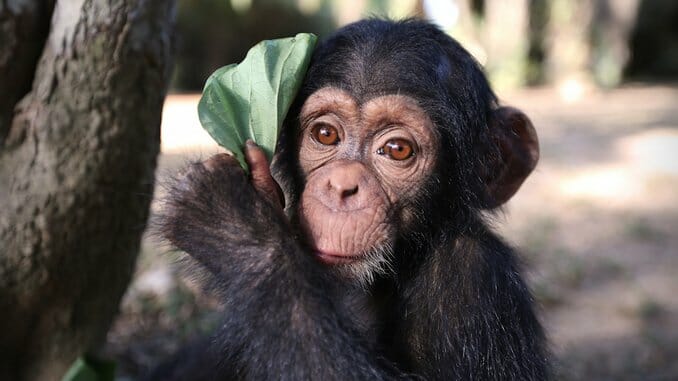Baby Chimp Rescue: Adorable, Heartbreaking, Essential
Move aside Grogu, these chimps are the cutest babies on TV this year.
Photos Courtesy of BBC America
Baby chimps are absolute maniacs. This is clear from the start of BBC America’s documentary series Baby Chimp Rescue. But what is just as apparent is their capacity and need for love and care, especially since every single chimpanzee we meet is a survivor. Before arriving at the Liberia Chimpanzee Rescue and Protection home run by American couple Jimmy and Jenny Desmond, all of these rescued babies saw their mothers killed for bushmeat. With many of the babies sustaining bullet and shrapnel wounds and broken bones from the capture, they were then illegally sold as pets.
It’s an incredibly hard but essential part of this story, because the first thing you think when you see all of these adorable baby chimps is: I want one. And while the babies are incredibly sweet and playful, the series notes that chimps become increasingly hard to control as they age and grow stronger, leading many who are first taken on as pets to end up killed. In an area where they are critically endangered after an 80% population loss, that cannot stand.
The beating heart of this three-part series (that is produced, directed, and filmed by Rob Sullivan), are the likable, impassioned, down-to-earth Desmonds. Husband Jimmy is a wildlife veterinarian who, along with his conservation-focused wife Jenny, has been working with animals in various international programs for decades. Arriving in Liberia after the dismantling of an American research project eventually left many chimps without a home and unable to fend for themselves in the wild, the Desmonds stepped in to adopt every chimp that needed rescuing. What started with two ended up expanding to over 60, all but two of whom are under seven years old per the organization’s website.
With the help of a team of local carers, the Desmonds have devoted their lives to rehabilitating these chimpanzees—including an ambitious but necessary move to a protected land area to help with overcrowding issues. The series details all of this and more, including the Desmonds’ relationship with local law enforcement to assist with confiscations and the arrest of poachers. But nothing is more compelling than the story of a chimp who has lived their life in bondage—often chained, beaten, and neglected—end up rescued, loved, and socialized within the sanctuary. That moment where a timid, traumatized chimp eventually stumbles in with the others to enjoy play and the embrace (and tickles!) of their new found family will bring joyful tears. Watching these scamps crawling all around a car, beeping the horn, licking the windshield, and half-destroying everything with insatiable curiosity will make you laugh. Seeing them run back to their carers and hug and cuddle them will make you cry again. These little fiends are absolute legends.
For those familiar with other BBC documentaries, the same measured rules apply. There is limited narration and the score is quiet and hopeful; the circumstances are largely explained by those in the middle of it and living it day to day. The camerawork has a guerrilla-style nature to it (especially when a large, older chimp escapes and a cameraman chucks the camera down to get out of the way), but the editing is crisp, expertly delivering some exceptionally great shots alongside explanations by the Desmonds and others that helps keep the momentum constantly moving forward. Baby Chimp Rescue is never stodgy, maudlin, or over-hyped. It presents the basic facts of an extraordinary situation with practiced aplomb.
-

-

-

-

-

-

-

-

-

-

-

-

-

-

-

-

-

-

-

-

-

-

-

-

-

-

-

-

-

-

-

-

-

-

-

-

-

-

-

-








































